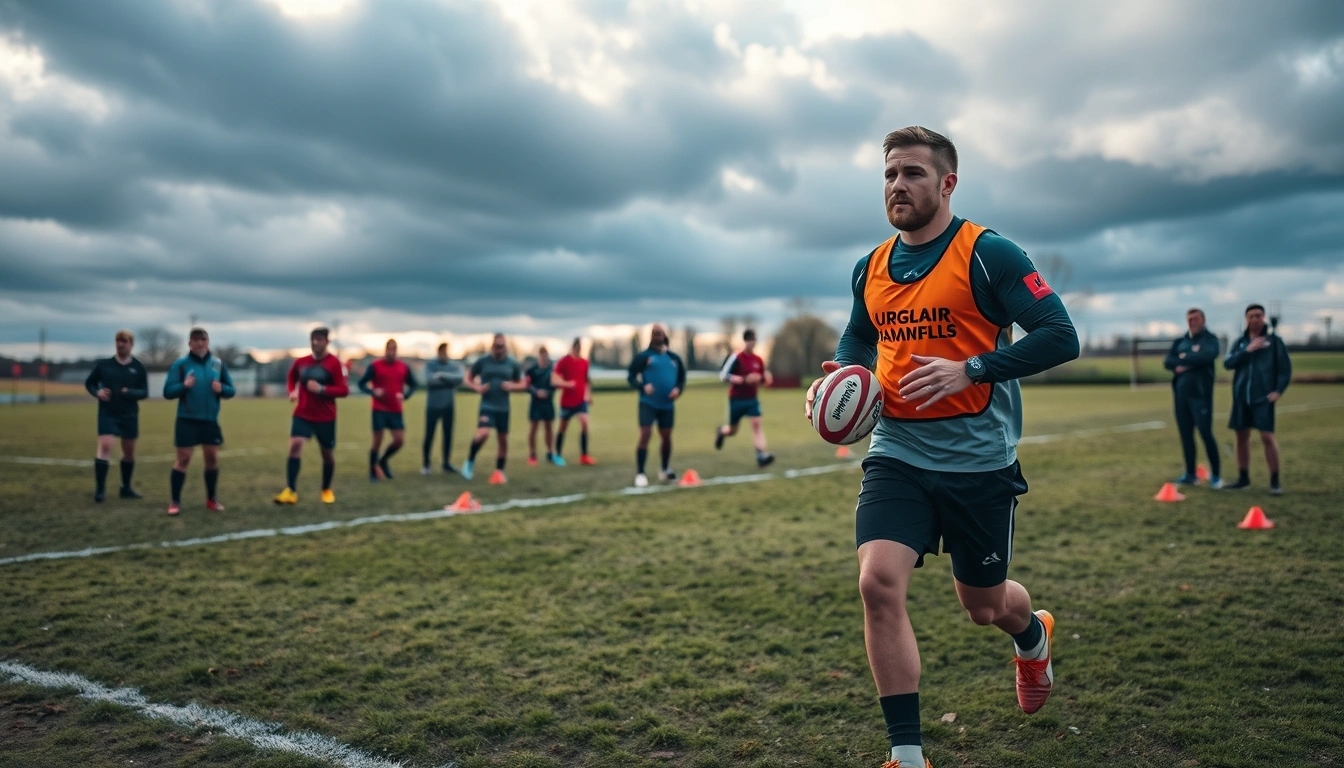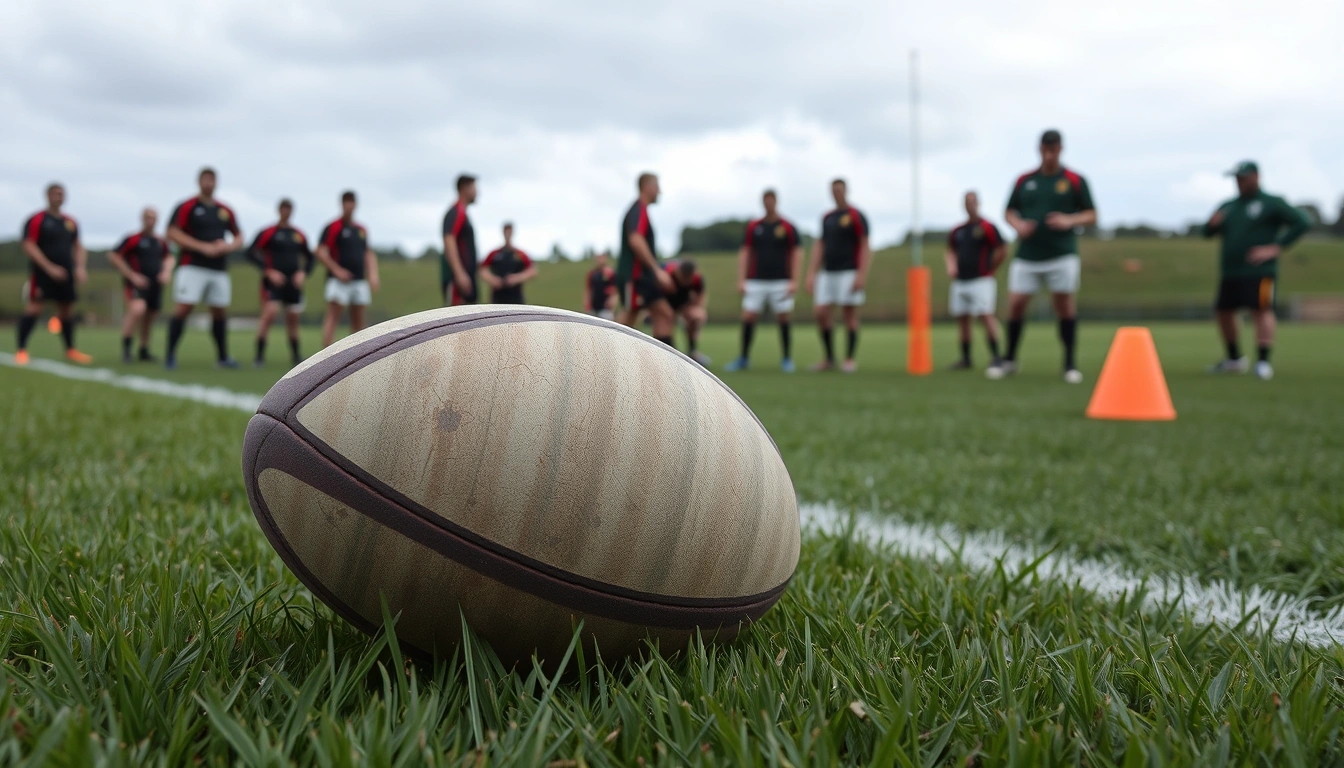So, you’re thinking about jumping into rugby but have zero clue where to start? Don’t sweat it — plenty of folks have been exactly where you are right now. Rugby isn’t some exclusive club for lifelong athletes; it’s a sport that welcomes anyone willing to get a bit muddy, bruised, and maybe even a little confused at first. Here’s a no-nonsense, straight-talking guide to help you get off the sidelines and onto the pitch without looking like a total lost cause.
Understanding Rugby Basics
Before you even lace up your boots, it’s smart to get a rough idea of what rugby’s all about. No need to memorize every rule (you’ll pick those up on the fly), but knowing the basics like how the game flows, what a “try” is, and why everyone’s running around chasing an oddly shaped ball will save you from staring blankly during your first few games.
| Key Rugby Fundamentals | Why It Matters |
|---|---|
| Positions (Forwards & Backs) | Helps you understand your role and where to stand |
| Basic Rules (Offside, Tackling) | Keeps you from getting penalized constantly |
| Scoring (Try, Conversion, Penalty) | Knowing how points are made keeps you motivated |
Finding the Right Club for Beginners
Not every rugby club is a newbie paradise. Some places are more competitive or expect you to already know a thing or two. Do your homework. Look for clubs advertising beginner sessions or “social rugby.” Don’t be shy—email or call them, ask about their training style, and whether they have someone who can help rookies.
- Check online forums or local community boards.
- Visit a training session as a spectator first.
- Ask about mixed ability teams.
What to Expect at Your First Training
Brace yourself: your first training might feel like boot camp. Expect a mix of warm-ups, basic drills (passing, catching, tackling basics), and some fitness work. Coaches usually get that beginners aren’t pros yet, but they’ll want you to try hard and listen up. Don’t worry if you’re panting like a dog or fumbling the ball—everyone’s been there.
Essential Gear for New Players
You won’t need a wardrobe full of expensive kit. At minimum, grab:
- Rugby boots (cleats) for grip.
- A mouthguard (seriously, protect those pearly whites).
- Comfortable sportswear (shorts and a jersey or t-shirt).
Some clubs lend gear, so ask before splurging. Safety first, but don’t bankrupt yourself on fancy stuff you might outgrow.
Building Fitness for Rugby
Rugby is no joke physically. You’ll need stamina, strength, and speed. Start slow: jog, do some bodyweight exercises, and maybe toss in a bit of sprinting. Don’t expect to be a beast overnight, but consistent effort pays off. Bonus: better fitness means fewer injuries and less feeling like a sack of potatoes on the field.
| Fitness Focus | Simple Exercises |
|---|---|
| Endurance | Jogging, cycling |
| Strength | Push-ups, squats |
| Agility | Ladder drills, shuttle runs |
Learning the Rules on the Fly
Rugby’s rulebook looks intimidating, but don’t drown in it. Focus on understanding the flow and common penalties first. Watch games (live or online), ask teammates questions, and don’t be embarrassed to admit when you’re clueless. The rules will slowly stick with time.
Overcoming Fear and Injury Worries
Yes, rugby’s physical and injuries happen. But it’s not some reckless brawl. Proper technique, warm-ups, and listening to your body go a long way. If you’re nervous, that’s normal! Talk to your coach about your concerns. Remember, fear is natural but don’t let it stop you from enjoying the game.
Making Friends and Team Spirit
Rugby’s magic isn’t just the game; it’s the mates you make. Show up, be friendly, laugh at your mistakes, and join in social events. Team spirit makes even the toughest training sessions bearable and turns teammates into lifelong pals.
Common Mistakes New Players Make
Here’s a quick heads-up on rookie traps:
- Trying to do everything perfectly from day one (spoiler: impossible).
- Ignoring fitness and thinking skills alone will cut it.
- Not asking questions or hiding when confused.
Avoid these, and you’ll save yourself some headaches.
Progressing from Rookie to Regular
Consistency is king. Keep showing up, listen to feedback, work on your weaknesses, and don’t be discouraged by setbacks. Coaches notice effort and attitude, so bring both.
Balancing Rugby with Life Commitments
Rugby’s a commitment, but life’s busy. Prioritize your schedule, communicate with coaches, and don’t burn out trying to do too much. It’s a marathon, not a sprint.
Resources and Support for New Rugby Players
From YouTube tutorials to local mentors, don’t hesitate to tap into resources. Here’s a quick list:
- World Rugby’s official website
- Beginner rugby YouTube channels
- Local club social media pages
- Community sports forums
Jump in, have fun, and remember: every rugby legend started just like you—unsure, awkward, and ready to tackle the unknown.
Understanding Rugby Basics
So, you’re thinking about jumping into rugby but have zero clue where to start? Chill, you’re not alone. Rugby might look like a chaotic mashup of running, tackling, and yelling, but beneath all that rough and tumble lies a game with clear rules, defined roles, and a rhythm you’ll soon catch on to. Let’s break down the essentials so you don’t end up standing on the pitch like a lost tourist.
First things first: the rules. Rugby isn’t just about smashing into each other (though, yeah, that’s a big part). The main goal is simple — score more points than the other team by either touching the ball down in their in-goal area (a “try”) or kicking it through the posts. But here’s the kicker: you can only pass the ball backward or sideways. Forward passes? Nope, that’s a no-go and usually means a scrum for the other side. Also, the game is split into two halves, typically 40 minutes each, with a halftime break to catch your breath and maybe curse your clumsy tackles.
| Basic Rugby Rules | What You Need to Know |
|---|---|
| Passing | Must be lateral or backward, never forward |
| Scoring | Try 5 points, Conversion kick 2 points, Penalty kick/drop goal 3 points |
| Game Duration | 2 halves of 40 minutes each |
| Tackling | Only below the shoulders, no dangerous play |
Positions? Oh yeah, there’s a bunch. You’ve got forwards and backs, each with their own jobs. Forwards are the big, burly types who love the scrum and lineouts — basically the muscle of the team. Backs are the speedsters and playmakers, darting around to create scoring chances. Don’t stress about memorizing every position right away; just know that everyone has a role, and you’ll find yours as you go.
- Forwards: Numbers 1-8, involved in physical contests for the ball.
- Backs: Numbers 9-15, focused on running, passing, and kicking.
Now, about gameplay essentials — rugby’s flow is a bit like controlled chaos. The ball is constantly moving, players tackle, rucks form when someone’s tackled and the ball is on the ground, and lineouts restart play when the ball goes out of bounds. It’s fast, physical, and sometimes confusing, but that’s part of the charm.
Tips to Remember:- Keep your eye on the ball, but don’t forget your teammates.- Stay on your feet during rucks and mauls.- Communicate – rugby is a team sport, not a solo gig.
In the end, the best way to get familiar with rugby’s fundamentals is to jump in, make mistakes, and laugh them off. Everyone starts somewhere, and no one expects you to be a pro on day one. So brush up on these basics, bring your enthusiasm (and maybe some bruises), and get ready to experience the thrill of rugby. You’ll be less lost than you think — promise.
Finding the Right Club for Beginners
Alright, so you’ve decided to give rugby a whirl, but here’s the kicker—not all rugby clubs are cut from the same cloth. Some clubs are like exclusive VIP lounges with a “no rookies allowed” sign flashing bright, while others roll out the red carpet for fresh faces who don’t know a ruck from a maul. The trick is spotting the clubs that genuinely welcome newbies with open arms and don’t make you feel like a fish out of water.
First off, don’t just Google “rugby clubs near me” and pick the first one that pops up. You gotta dig a little deeper. Look for clubs that advertise beginner-friendly sessions, “new player nights,” or even “introduction to rugby” programs. These are often signs that the club is serious about nurturing rookies rather than just churning out seasoned players.
But how do you really tell if a club is beginner-friendly? Well, here’s a quick checklist to help you sniff out the right place:
| What to Look For | Why It Matters |
|---|---|
| Dedicated beginner training sessions | Shows they’re patient and willing to teach basics |
| Experienced coaches with teaching skills | Good coaches can turn confusion into confidence |
| Welcoming atmosphere & social events | Rugby’s about team spirit, not just tackling |
| Positive reviews from new players | Real feedback beats flashy websites |
| Flexible training schedules | Life’s busy; clubs that get that are winners |
Now, don’t be shy about reaching out. Drop a message or call the club’s contact person and ask directly, “Hey, I’m a newbie, is there a spot for me?” If they sound like they’re reading from a script or brushing you off, keep looking. A club that values beginners will be stoked to hear from you and will likely invite you to a trial session or a meet-and-greet.
Oh! And here’s a little nugget of wisdom: visit the club before committing. Watch a training session, chat with players, and get a feel for the vibe. If everyone looks like they’re having a blast and the coaches don’t seem like drill sergeants, you’re probably onto a winner.
- Don’t worry about skill level: Everyone starts somewhere, and clubs that get this will help you grow.
- Ask about equipment: Some clubs lend gear to beginners so you’re not out of pocket right away.
- Check if they have mixed-ability teams: Playing alongside others at your level is less intimidating.
Remember, joining a rugby club is more than just learning the game; it’s about finding a community. The right club will make you feel like you belong, even if you trip over the ball a few times. And trust me, that’s all part of the fun.

What to Expect at Your First Training
So, you’ve finally mustered up the courage to show up at your very first rugby training session. Brace yourself, because it’s not all sunshine and rainbows—your body might scream a little, your brain might feel like mush, and your ego might take a tiny hit. But hey, that’s part of the charm, right? Let’s break down what’s likely waiting for you on that grassy battlefield.
Warm-Ups: The Necessary Evil
First off, don’t expect to just stroll onto the pitch and start smashing tackles. Coaches are pretty serious about warming up because rugby is a full-contact sport, and injuries aren’t exactly rare. You’ll probably spend 15 to 20 minutes jogging, doing dynamic stretches, and maybe some quirky drills that look more like a dance party gone wrong. Trust me, those stretches might feel silly, but they’re lifesavers when it comes to dodging pulled muscles later.
Drills: The Meat and Potatoes
Once you’re sufficiently warmed up and not moaning too loudly, the real fun begins—drills. These can range from simple passing exercises to sprinting and tackling practice. Don’t worry if you fumble the ball or trip over your own feet; everyone does at first. Coaches expect beginners to be a bit clumsy, but they want to see hustle and a willingness to learn more than perfection.
| Common Drills at First Training | Purpose | What Coaches Look For |
|---|---|---|
| Passing drills | Improve ball handling and teamwork | Accuracy, timing, and communication |
| Tackling technique | Learn safe and effective tackling | Body position and commitment |
| Fitness runs | Build endurance and speed | Effort and stamina |
Coach Expectations: No, They Don’t Want You to Be a Pro Immediately
Let’s get one thing straight: coaches are not expecting you to channel your inner All Black on day one. What they really want is enthusiasm, a positive attitude, and a willingness to listen. Rugby’s a team sport, so showing up on time, paying attention, and trying your best counts for a lot. If you’re gasping for air after five minutes, that’s fine—just don’t quit.
- Show up prepared: Wear comfortable sportswear and bring water.
- Ask questions: No one expects you to know everything.
- Be patient: Skills take time to develop.
- Respect the game: Rugby has its own culture and rules.
Heads-Up: It’s Gonna Hurt (A Little)
Rugby isn’t gentle. Expect some bumps, bruises, and maybe a few awkward falls. But that’s part of the initiation. If you’re too scared of getting roughed up, maybe this isn’t your jam—or maybe just stick to watching from the sidelines for a bit. Still, most clubs have safety protocols and coaches will teach you how to tackle and fall properly so you don’t end up a human pancake.
In short, your first rugby training session is a cocktail of excitement, exhaustion, and a smidge of embarrassment. But stick with it, and you’ll soon find yourself looking forward to those drills and even the dreaded warm-ups. Remember, every rugby legend started exactly where you are right now—awkward, out of breath, and wondering if they’d made a huge mistake.
Summary Table: First Training Essentials
| Aspect | What to Expect | Tips |
|---|---|---|
| Warm-up | Jogging, stretching, mobility drills | Don’t skip it! Prevents injuries |
| Drills | Passing, tackling, fitness runs | Focus on effort, not perfection |
| Coach Expectations | Enthusiasm, punctuality, willingness | Be open and ask questions |
| Physicality | Some bumps and bruises likely | Learn proper techniques, stay safe |
So, lace up those boots, bring your best attitude, and get ready to dive headfirst into rugby madness. It won’t be perfect, but it sure as hell will be memorable.
Essential Gear for New Players
So, you’ve decided to jump headfirst into rugby, huh? Good on ya! But before you start dreaming about those big tackles and glorious tries, let’s talk gear. Now, don’t get it twisted—you don’t need to empty your wallet buying the fanciest stuff out there. Rugby’s not about flash; it’s about grit, sweat, and a bit of mud. However, some basics? Yeah, those are absolutely non-negotiable. No, you can’t just rock up in your old sneakers and call it a day. Let’s break it down so you know exactly what you really need to get started without going broke.
| Gear Item | Why You Need It | Budget-Friendly Tips |
|---|---|---|
| Rugby Boots | Proper grip on the pitch is key. Slipping around like a newborn calf won’t help your game or your confidence. | Look for second-hand boots or last season’s models. Avoid running shoes—they just won’t cut it. |
| Mouthguard | Protects those pearly whites and your jaw. Trust me, getting smacked without one is no fun. | Custom-fit is great but a boil-and-bite mouthguard works just fine for starters. |
| Rugby Shorts & Jersey | Designed to withstand pulls and tackles without tearing apart. Plus, the jersey helps teammates spot you. | Club kits are usually affordable, or snag some generic versions online. |
| Socks | Long, thick socks protect your shins and keep your boots comfy. | Any long athletic socks can do initially, but rugby-specific ones last longer. |
| Optional: Headgear & Shoulder Pads | Extra protection for beginners worried about knocks and bumps. | Don’t rush into buying these; assess your comfort level first. |
Look, I get it, the gear list might seem a bit much at first glance. But here’s a little secret: rugby gear is all about functionality, not fashion. You don’t need to look like you’re auditioning for a sci-fi movie. Your main goal is to stay safe and comfortable while you learn the ropes. Speaking of safety, that mouthguard? Seriously, don’t skip it. You might think, “Ah, I’m just starting, I won’t get hit hard.” Spoiler alert: you will. And when you do, you’ll thank me.
Now, if you’re wondering about the cost, let’s cut through the noise. A decent pair of boots and a mouthguard are your biggest investments. Jerseys and shorts? Usually, clubs provide or sell them at a reasonable price. Socks? Pfft, those are cheap. And headgear or pads? Totally optional, especially if you’re still figuring out if rugby’s your thing or just a passing fancy.
- Pro Tip #1: Don’t buy everything at once. Start with boots and mouthguard, then add other items as you go.
- Pro Tip #2: Check with your club—some clubs lend gear to beginners or have second-hand sales.
- Pro Tip #3: Comfort over style. If it feels awkward, it’ll distract you on the field.
Before you go splurging on the fanciest gear, remember: rugby is about heart, hustle, and teamwork. The right gear helps, sure, but it’s not gonna make you a legend overnight. Focus on learning the game, getting fit, and building confidence. The rest will come with time.
In conclusion, the essentials boil down to a good pair of boots, a reliable mouthguard, and some basic clothing that won’t fall apart after the first tackle. Everything else? Nice to have, but not mission-critical. So, gear up smartly, hit that training, and get ready to embrace the glorious chaos that is rugby.
Building Fitness for Rugby
Let’s get real: rugby isn’t for the faint-hearted. It’s a brutal, fast-paced game that demands more than just showing up and hoping for the best. If you want to avoid being the guy gasping for air five minutes in or, worse, the slowpoke everyone’s trying to avoid on the field, you’ve got to seriously up your fitness game. But don’t freak out just yet — you don’t need to be an elite athlete overnight. It’s about steady progress, smart training, and a pinch of stubborn grit.
First off, rugby fitness isn’t just about running fast or lifting heavy. It’s a cocktail of endurance, strength, agility, and a bit of that elusive “rugby toughness.” You’ll want to build cardiovascular stamina so you can keep going through those relentless phases of play — trust me, the game won’t wait for you to catch your breath. Mix in some strength training because, let’s face it, you’ll be tackling and getting tackled. And agility drills? Absolutely necessary. You’ve got to dodge, weave, and sprint like your life depends on it (or at least your pride).
| Fitness Component | Why It Matters | Sample Exercises |
|---|---|---|
| Endurance | Keep up with the nonstop action and recover quickly between plays. | Interval running, cycling, swimming |
| Strength | Power through tackles and hold your ground. | Squats, deadlifts, bench press |
| Agility | Change direction fast and avoid getting flattened. | Ladder drills, cone drills, shuttle runs |
Now, if you’re thinking, “Great, sounds like a lot,” well, you’re not wrong. But here’s the trick: you don’t have to train like a pro every single day. Mix it up. For example, do endurance work 2-3 times a week, strength training twice, and sprinkle in agility drills whenever you can. And don’t forget recovery — your muscles need some TLC or you’ll be hobbling around like an old man.
- Tip 1: Start slow and build up. Nobody expects you to run a marathon on week one.
- Tip 2: Incorporate rugby-specific drills, like tackling dummies or passing under pressure, to make training relevant.
- Tip 3: Hydrate and fuel your body properly — pizza and beer won’t cut it if you want to improve.
Here’s a quick weekly plan to get you started:
Monday - Interval running & agility drillsTuesday - Strength training (focus on legs and core)Wednesday - Rest or light swimmingThursday - Endurance cycling & tackling practiceFriday - Strength training (upper body)Saturday - Team training or scrimmageSunday - Rest and recovery
Remember, rugby fitness isn’t just about looking good in shorts (although that’s a nice bonus). It’s about being able to take hits, dish them out, and still have the energy to play smart. So, lace up, hit the gym or park, and embrace the grind — because in rugby, the fittest survive.
Bottom line: Don’t expect miracles overnight. It’s a journey full of sweat, sore muscles, and probably some moments where you want to quit. But stick with it, and soon enough, you’ll be the one making others look slow on the pitch.

Learning the Rules on the Fly
Alright, so you’ve signed up for rugby, and now you’re staring at a rulebook thicker than your grandma’s old recipe collection. Yeah, rules can be a total headache, no sugarcoating it. But here’s the kicker — you’ll actually pick them up way faster than you think. No need to drown yourself in jargon or pretend you’re a walking rugby encyclopedia right off the bat. Let’s break it down so you don’t get lost in the chaos.
First things first: rugby rules aren’t designed to trip you up; they’re there to keep the game flowing and safe. But don’t expect to learn everything overnight. It’s more like a slow burn. You’ll get the basics pretty quickly — like what a try is, the difference between a scrum and a lineout, and why you can’t just throw the ball forward willy-nilly. The rest? That’ll come with time, practice, and a few facepalm moments watching the pros.
| Key Rugby Rules to Absorb Early | Why It Matters |
|---|---|
| The Offside Rule | Prevents players from hanging out in front of the ball, keeping the game fair and strategic. |
| Forward Pass | You can only pass the ball backward or sideways — forward passes penalty. |
| Tackling | Only below the shoulders and with control; dangerous tackles get penalized. |
| Rucks and Mauls | How players contest possession after a tackle; confusing at first, but vital to understand. |
Now, here’s a pro tip: don’t try to memorize every single rule like you’re cramming for a test. Instead, focus on the “why” behind the rules. Why can’t you throw the ball forward? Because it keeps the game flowing and makes it more challenging. Why is offside such a big deal? Because it stops players from camping near the try line waiting for an easy score.
- Watch games with commentary: This is gold. Commentators break down plays and explain penalties in real-time.
- Ask questions: Don’t be shy. Coaches, teammates, or even friendly opponents usually love explaining rules.
- Use apps or quick guides: There are loads of rugby apps that simplify laws into bite-sized chunks.
Here’s the harsh truth — you’ll mess up. You’ll probably get penalized a bunch of times because you forgot a rule or misread a situation. It’s part of the learning curve. Don’t sweat it. Even seasoned players get caught offside or botch a scrum now and then. Rugby’s a fast game, and sometimes the rules seem to change on the fly (looking at you, referees).
Tips for Learning Rugby Rules on the Fly:- Start with basics: Try, offside, forward pass.- Watch games actively, not passively.- Play practice matches focusing on one rule at a time.- Don’t get overwhelmed; take breaks from the rulebook.- Learn from mistakes — they’re your best teachers.
In the end, rugby’s about having fun, getting stuck in, and gradually understanding the game’s heartbeat. The rules? They’ll become second nature before you know it. So, take a deep breath, suit up, and embrace the glorious confusion. You’re not alone in this — every rugby legend started exactly where you are right now.
Overcoming Fear and Injury Worries
Alright, let’s be real for a second—rugby is no walk in the park. It’s a full-contact, high-impact sport where bruises, bumps, and yes, injuries, are part of the package. If you’re new to the game, it’s totally normal to have that nagging voice in your head whispering, “What if I get hurt?” or “Can I really handle this?” Spoiler alert: you’re not alone, and there’s a way to manage these fears without turning into a nervous wreck who’s too scared to even lace up their boots.
First things first, accept that injuries do happen. It’s part of the game’s DNA. But here’s the kicker—most injuries are preventable if you take the right steps. Think of it like wearing a seatbelt: you don’t drive recklessly just because accidents happen, right? Same goes for rugby. Proper preparation and smart play go a long way in keeping you safe.
| Tip | Why It Helps |
|---|---|
| Learn the Rules Thoroughly | Knowing what’s legal and what’s not reduces risky tackles and surprises on the field. |
| Wear Proper Gear | From mouthguards to padded shorts, gear is your first line of defense. |
| Focus on Fitness | Stronger muscles and better endurance mean you can absorb impacts better and avoid injuries. |
| Communicate Constantly | Talking with teammates helps avoid collisions and keeps everyone on the same page. |
| Don’t Rush Into Contact | Ease into tackles and physical play gradually to build confidence and technique. |
Now, about that fear—yeah, it’s a beast. But here’s a little secret: fear is often just your brain’s way of trying to keep you alive. Instead of fighting it head-on, try to channel that nervous energy into preparation and focus. Visualize yourself making a solid tackle or sprinting down the field without a care. It sounds cheesy, but mental rehearsal works wonders.
And don’t beat yourself up if you’re still a bit jittery. Even seasoned players get the jitters before a big game. The trick is to accept the fear, but don’t let it control you. One practical way to do this is by breaking down the scary stuff into manageable chunks. For example, start by practicing basic drills and tackling dummies before jumping into full-contact scrums. Baby steps, people.
- Talk it out: Share your worries with your coach or teammates. Chances are, they’ve been there and can offer solid advice or just a sympathetic ear.
- Get professional help: If fear or anxiety is really messing with your head, don’t hesitate to chat with a sports psychologist or counselor.
- Celebrate small wins: Every time you get through a training session or game without injury, give yourself a pat on the back. Confidence builds slowly.
At the end of the day, rugby is about pushing your limits—but smartly. Injuries suck, no doubt, but they don’t have to define your experience. With the right mindset, preparation, and a pinch of grit, you can keep fear in check and enjoy the thrill of the game without turning into a bundle of nerves.
Remember:- Fear is normal, but don’t let it freeze you.- Safety gear isn’t optional; it’s your best mate.- Fitness and knowledge less chance of injury.- Take it step-by-step, no need to rush.
So lace up, breathe deep, and get ready to tackle those fears head-on—literally.
Making Friends and Team Spirit
Jumping into a rugby club isn’t just about lacing up your boots and hitting the grass; it’s about finding your tribe. Sure, the game’s the main event, but the real magic? It’s in the mates you make and the laughs you share off the pitch. If you think rugby is all about bruises and tackles, think again—there’s a whole social scene waiting for you, whether it’s post-match pints or banter-filled training sessions.
Now, let’s be honest, walking into a new club can feel like crashing a party where everyone already knows the secret handshake. But here’s the thing: rugby folk are generally pretty welcoming, even if you’re the newbie who trips over their own feet. The key is showing up consistently and being open to the awkward small talk. It might feel a bit cringe at first, but those “How long you been playing?” chats are the icebreakers that lead to real friendships.
| Action | Why It Works |
|---|---|
| Arrive early or stay late at training | Shows commitment and gives you time to chat without the pressure of drills |
| Join social events and club nights | Builds camaraderie beyond the game, where stories and jokes fly freely |
| Offer to help out with club duties | Being useful makes you memorable and respected |
| Be yourself—even if you’re a bit awkward | Authenticity attracts genuine connections, not fake mates |
Don’t underestimate the power of shared experiences. Rugby is a brutal sport, and surviving a tough training or a nail-biting match together creates instant bonds. You’ll find yourself swapping stories about that one ridiculous tackle or the time someone forgot their boots (yes, it happens). These moments are the glue of team spirit.
- Laugh at yourself: If you mess up, own it. Everyone does, and it’s a great way to break the ice.
- Celebrate wins and losses: Whether you smashed the opposition or got thrashed, sharing those highs and lows builds trust.
- Respect the veterans: They’ve been around the block and can give you tips on and off the field.
Remember, team spirit isn’t just about chanting in the locker room or doing synchronized warm-ups. It’s about supporting each other, on bad days and good, and creating a vibe where everyone feels they belong. If you’re lucky, your rugby club becomes a second family—one where the tackle counts just as much as the toast after the game.
Pro Tip: Don’t be shy about inviting a teammate for a coffee or a beer after training.Sometimes, the best friendships kick off off the field.
So, if you’re nervous about joining a rugby club because you’re worried about fitting in, remember this: everyone starts somewhere, and the social side of rugby is just as rewarding as the sport itself. Get stuck in, be patient, and soon enough, you’ll be the one welcoming the next newbie with open arms—and maybe a cheeky grin.

Common Mistakes New Players Make
Jumping into rugby without any prior experience? Well, spoiler alert: everyone messes up at first. It’s practically a rite of passage. But hey, don’t sweat it! Making mistakes is part of the learning curve, and knowing what pitfalls to avoid can save you from embarrassing moments or worse, minor injuries. Let’s dive into some of the most frequent newbie blunders and how you can sidestep them like a seasoned pro.
- Overestimating your fitness: Rugby demands stamina, strength, and speed. Beginners often underestimate how taxing a match or training can be. You might feel like a champ in the first 10 minutes, then suddenly find yourself gasping for air, lagging behind the pack. The fix? Build your fitness gradually. Incorporate cardio, strength training, and flexibility exercises into your routine before hitting the pitch hard.
- Ignoring proper tackling technique: Tackling isn’t just about brute force; it’s a skill that requires practice. Newbies sometimes go all Hulk smash, risking injury to themselves and others. Coaches love players who tackle smart, not just hard. So, listen carefully during training and don’t rush into tackles without mastering the basics.
- Not paying attention to positioning: Rugby positions can be confusing at first. Charging blindly into the fray without knowing where you should be is a common rookie error. Before your first game, spend some time understanding your role and where you fit into the team’s formation. It’s not just about running around; it’s about running smart.
| Mistake | Why It Happens | How to Avoid |
|---|---|---|
| Overconfidence in skills | New players think they can wing it without practice | Practice drills, listen to coaches, and stay humble |
| Neglecting warm-ups | Impatience or underestimating injury risks | Always warm up properly to avoid strains and sprains |
| Forgetting to communicate | Nervousness or lack of experience | Talk to teammates; rugby’s a team sport, after all |
Now, let’s talk about the mental game. New players often freeze up or get overwhelmed by the fast pace and physicality. It’s totally normal to feel like you’re drowning in information or lagging behind your mates. The trick? Focus on small wins. Celebrate nailing that first clean pass or making a solid run. Rugby isn’t mastered overnight, so cut yourself some slack.
Also, don’t be that person who’s too scared to ask questions. Coaches and teammates expect beginners to be curious and eager to learn. If you’re confused about a rule, a drill, or even how to lace your boots properly, just ask. Trust me, everyone was once the clueless newbie.
- Trying to do everything at once: Rugby is complex. Trying to memorize every rule, position, and play in your first week is a recipe for burnout. Focus on basics first—getting fit, learning to pass, and understanding the flow of the game.
- Ignoring recovery: Rugby is rough on the body. Skipping rest days or ignoring minor aches can lead to bigger problems. Listen to your body and don’t be a hero.
Quick Tips for New Rugby Players:- Show up consistently; practice beats talent when talent doesn’t practice.- Keep hydrated and fuel your body properly.- Watch games, even if you don’t understand everything, it helps.- Find a buddy in the team to keep motivated.
In short, making mistakes is part of the rugby journey. The key is to learn from them quickly and not let them knock your confidence. Remember, even the pros started as clueless rookies who fumbled their way through their first matches. So, embrace the chaos, laugh off the blunders, and keep pushing forward. Rugby’s as much about resilience as it is about skill.
Ready to tackle those rookie mistakes head-on? Good. Now get out there and give it your best shot!
Progressing from Rookie to Regular
So, you’ve survived your first few rugby sessions without face-planting too hard or accidentally scoring for the other team — congrats! But now what? Getting in the door is just the start. The real game is about leveling up your skills, snagging more playtime, and earning your spot as a dependable team player. Sounds simple, right? Well, not exactly. It takes a mix of hustle, patience, and a willingness to look like a total muppet before you get it right.
First off, improving your skills isn’t some magic switch you flip overnight. It’s all about repetition and feedback. Don’t just show up and expect to be the next Jonah Lomu. Instead, focus on mastering the basics: passing, tackling, and positioning. Ask your coach or teammates for tips — most players love sharing advice, especially if you’re humble and eager. And hey, watching match replays or YouTube tutorials during your downtime isn’t cheating; it’s smart.
| Skill | How to Improve | Common Pitfalls |
|---|---|---|
| Passing | Practice short, crisp passes with a partner; focus on accuracy over power. | Throwing too hard or too soft; not following through. |
| Tackling | Learn proper form from coaches; start slow and build confidence. | Leading with the head or hesitating mid-tackle. |
| Positioning | Understand your role; watch experienced players during games. | Being out of place when the ball moves fast. |
Next up, earning more playtime is a bit of a dance. Coaches want to see effort, attitude, and improvement — not just raw talent. Showing up early, staying late, and being the first to volunteer for drills can get you noticed. Also, don’t be afraid to ask for feedback after training. It might sting a little, but it’s the only way to know what you’re doing right or wrong.
- Be consistent: Flaky attendance less trust from coaches.
- Stay positive: Rugby’s tough; keep your chin up when things get rough.
- Support teammates: Being a team player off the pitch counts as much as on it.
Finally, becoming a valued team member goes beyond skills and fitness. Rugby is as much about camaraderie and communication as it is about brute strength. Chat with your mates, get involved in socials, and don’t be that guy who’s only about themselves. Trust me, teams notice when you’re genuinely invested in the group, not just the game.
Here’s a quick checklist to keep you on track:
[ ] Practice regularly and focus on basics[ ] Seek and apply feedback from coaches[ ] Show up consistently and on time[ ] Volunteer for extra drills and tasks[ ] Build relationships with teammates[ ] Keep a positive mindset, even when you mess up[ ] Watch games and learn from others
Remember, nobody becomes a star player overnight. The journey from rookie to regular is messy, frustrating, and sometimes downright embarrassing. But stick with it, and you’ll find yourself not just playing rugby — but loving it, and becoming a crucial part of your team’s success story.
Balancing Rugby with Life Commitments
So, you’ve caught the rugby bug — awesome! But hold up, life doesn’t just hit pause because you’ve decided to chase that oval ball around a muddy pitch. Work deadlines, school assignments, family dinners, and the occasional Netflix binge all want a slice of your time too. Juggling rugby with everything else can feel like trying to herd cats, but hey, it’s not impossible. Let’s get real about how to keep your head above water without turning into a stressed-out mess.
First off, time management isn’t just a buzzword your boss throws around. It’s your lifeline. Start by carving out your week with a planner or a trusty app — whatever floats your boat. Block out training sessions, matches, and crucial downtime. Yes, downtime is a thing and you need it more than you think. Overloading yourself is a fast track to burnout, and nobody wants that.
| Commitment | Tips to Manage | Potential Pitfalls |
|---|---|---|
| Work | Communicate your rugby schedule early; use lunch breaks for quick recovery or light training. | Last-minute overtime can mess with practice plans. |
| School | Prioritize assignments; study in chunks; ask for extensions if rugby events clash. | Procrastination leads to stress and missed games. |
| Family | Schedule quality time; involve them if possible (bring them to games!). | Feeling guilty for missing family events. |
One sneaky trap is thinking you can do it all perfectly. Spoiler: you can’t. Sometimes, you’ll have to skip a training session or bail on a social event. And that’s okay. Rugby is a team sport, sure, but your wellbeing is the MVP here. Don’t hesitate to chat with your coach or teammates about your availability. Most clubs get it — life’s messy.
- Set realistic goals: Don’t expect to be the star player overnight while acing every other part of life.
- Listen to your body: Rugby’s tough; pushing through fatigue only leads to injuries.
- Use support networks: Friends, family, fellow players — lean on them when things get hectic.
Here’s a little nugget for you: “You’re not a machine, so stop acting like one.” Seriously, give yourself permission to rest. Mental and physical recovery are just as important as those grueling sprints on the field. And if you ever feel overwhelmed, step back and reassess. It’s better to take a breather than to burn out and quit altogether.
Practical Weekly Schedule Example:Monday: Work 9-5, Rugby training 6-7:30pmTuesday: Work 9-5, Study 7-9pmWednesday: Work 9-5, Rest or light stretchingThursday: Work 9-5, Rugby training 6-7:30pmFriday: Work 9-5, Family dinner or social timeSaturday: Match day or extra trainingSunday: Recovery, errands, prep for week
In the end, balancing rugby with life commitments is a bit like the game itself — sometimes you’re sprinting, sometimes you’re in a scrum, and other times you’re just catching your breath on the sidelines. The key is to stay flexible, keep your eyes on what matters, and remember why you started playing in the first place: because it’s fun, challenging, and downright rewarding.
So, lace up those boots, but don’t forget to lace up your life with a bit of patience and humor. You’ve got this.

Resources and Support for New Rugby Players
Diving headfirst into rugby can feel like trying to learn a new language overnight—confusing terms, tricky rules, and a whole lot of new faces. But hey, don’t sweat it! There’s a treasure trove of resources out there ready to catch you when you fumble your first pass or trip over your own feet. Whether you’re glued to your screen or prefer a good old-fashioned chat with someone who’s been there, done that, you’ve got options.
Online Tutorials and Videos are the go-to for many rookies. Platforms like YouTube have endless clips—from basic passing drills to game strategy breakdowns. Some channels even sprinkle in humor, which is a lifesaver when you’re trying not to feel overwhelmed. Just beware: not all tutorials are created equal. Some coaches talk so fast you’d think they’re narrating a thriller. Here’s a quick checklist to keep you sane while binge-watching rugby content:
- Look for beginner-friendly content: Avoid jargon-heavy videos at first.
- Follow channels with clear demonstrations: Seeing is believing, after all.
- Check comments for feedback: Sometimes viewers call out mistakes or offer tips.
Now, if you’re more of a “hands-on” learner, local mentors and clubs can be your best pals. Nothing beats having someone patiently explain why the scrum feels like a human wall or how to avoid looking like a lost puppy during drills. Many clubs offer beginner sessions or buddy systems where you get paired with experienced players who don’t mind answering your endless questions.
| Resource Type | What You Get | Pros | Cons |
|---|---|---|---|
| Online Tutorials | Video lessons, drills, rule explanations | Accessible anytime, free or cheap | Can be overwhelming, no personal feedback |
| Local Mentors | One-on-one guidance, personalized tips | Hands-on learning, builds confidence | Availability depends on location |
| Rugby Forums & Social Groups | Community advice, shared experiences | Great for motivation and questions | Advice quality varies, can be time-consuming |
Don’t underestimate the power of forums and social media groups dedicated to rugby. Reddit’s rugby threads or Facebook groups can be a mixed bag of wisdom, jokes, and sometimes the odd rant about a referee’s worst call ever. But hey, it’s real talk and can keep you motivated when you’re questioning your life choices after a tough training session.
Lastly, consider grabbing a copy of a beginner’s rugby book or app. These often break down complex rules into digestible chunks and include handy diagrams. Plus, flipping through pages or scrolling on your phone while waiting for practice to start is a great way to sneak in some learning without feeling like a total newbie.
Top Tips for Using Resources Effectively:- Don’t try to learn everything at once. Focus on one aspect at a time.- Practice what you watch or read ASAP to reinforce learning.- Ask questions—there’s no such thing as a dumb question in rugby.- Mix online learning with real-life practice for the best results.
So, whether you’re a couch warrior or a social butterfly, the rugby world has your back. Keep poking around these resources, stay curious, and remember: every pro was once a rookie who didn’t know which way to run. You’ve got this!
Frequently Asked Questions
- Do I need any prior experience to join a rugby club?
Absolutely not! Rugby clubs, especially those welcoming beginners, are designed to teach you from the ground up. Think of it like learning to ride a bike—you start wobbly, but with practice, it becomes second nature.
- What should I expect during my first rugby training session?
Your first session might feel like jumping into the deep end, but don’t worry! Expect light warm-ups, basic drills, and plenty of guidance from coaches who understand you’re new. It’s all about getting comfortable and having fun while learning.
- What essential gear do I need to start playing rugby?
Keep it simple at first: a good pair of rugby boots, a mouthguard, and comfortable sportswear. No need to break the bank—clubs often have loaner gear or recommendations for affordable options.
- How can I improve my fitness for rugby?
Rugby is a fast-paced, physical sport, so building endurance and strength helps big time. Try mixing cardio workouts like running or cycling with strength training. Think of your body as a rugby machine gearing up for action!
- Will I be overwhelmed by rugby rules?
It’s normal to feel a bit lost at first. The key is to learn the basics and pick up the rest as you play. Coaches and teammates are usually happy to explain, and watching games can turn confusing rules into aha moments.
- How do I overcome fear of injury in rugby?
Rugby is tough, but with proper technique and safety gear, you can minimize risks. Focus on learning how to tackle and fall correctly, and remember—every player was once a beginner who faced those same fears.
- Is rugby just about playing, or is there more to it?
Rugby is as much about friendship and team spirit as it is about the game. Joining a club means becoming part of a community where you’ll make mates, share laughs, and feel a real sense of belonging.
- What are common mistakes new rugby players make?
Newbies often try to rush tackles or ignore fitness, which can lead to injuries or frustration. Take your time, listen to coaches, and focus on learning fundamentals before pushing too hard.
- How can I progress from a rookie to a regular player?
Consistency is your best friend. Attend training regularly, ask for feedback, and practice outside sessions. With dedication, you’ll see your skills grow and earn more playtime on the field.
- How do I balance rugby with work or school?
Time management is key. Plan your week ahead, prioritize commitments, and communicate with your club about your availability. Remember, rugby should add joy, not stress, to your life.
- Where can I find resources to help me learn rugby?
There are tons of online tutorials, local mentors, and community groups ready to help. Don’t hesitate to ask your club for recommendations—they want you to succeed!













